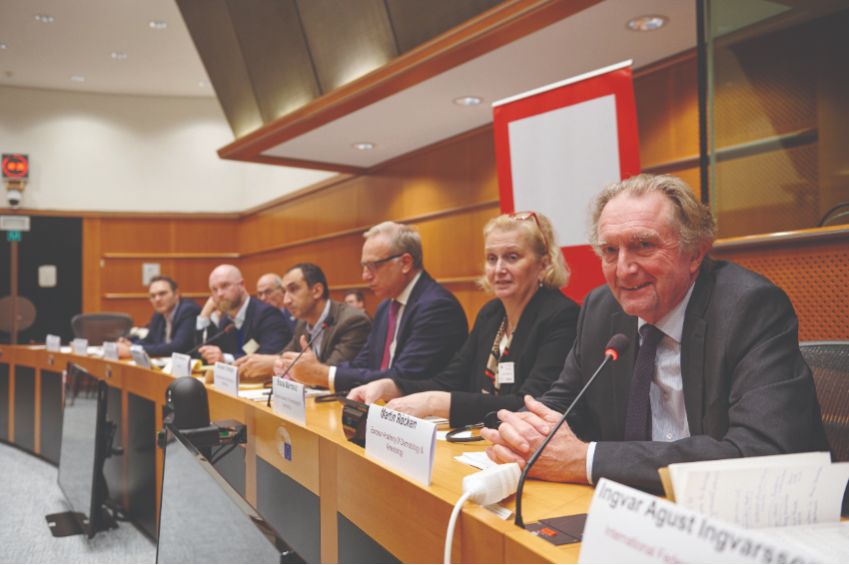Skin diseases often go under the radar, but their impact on Europeans is widespread. Nearly one in two European’s has experienced a skin disease over the last 12 months, around 185 million people. To shine a light on the significance of skin diseases, the European Academy of Dermatology and Venereology (EADV) gathered MEPs and stakeholders at the European Parliament to discuss the burden of skin disease in Europe.
MEP István Ujhleyi (S&D, HU), one of the event co-hosts, underlined the importance of a unified approach to tackling skin diseases. “Diseases don’t care about our age, nationality or political party: they can affect all of us. That is why they can have a heavy physical, social, emotional and economic burden on the individual and society” Ujhleyi explained. “To tackle them, we need a broad coalition”. Fellow co-host MEP Radka Maxová (S&D, CZ) explored the impact of skin diseases in relation to mental health. “Skin diseases are not always immediately visible” she told the meeting participants, “they also impact mental wellbeing and overall quality of life”. “Skin diseases can lead to isolation and judgement, including amongst children, and impact self-esteem and development” Maxová reminded the audience.
“Diseases don’t care about our age, nationality or political party: they can affect all of us. That is why they can have a heavy physical, social, emotional and economic burden on the individual and society” – MEP István Ujhelyi (S&D, HU)
“The spectrum of skin diseases is very wide, ranging from mild to very severe. They are frequently considered as something easy to treat” Prof. Dr. Martin Röcken told the room, but the opposite is the case. Many diseases like psoriasis, autoimmune diseases, severe allergic reactions or skin cancer are frequently mutilating or even deadly. Röcken demonstrated the urgent need of dermatology for the diagnosis of the severe diseases affecting the patients’ life, and then demonstrated the impressive role of dermatology in driving the development of novel therapies. The break-through in cancer immune therapy, now saving the lives of cancer patients in almost all medical disciplines or the development of the new drugs against severe inflammatory diseases are two examples, where dermatology has a major impact on medicine in general.

Prof. Marie-Aleth Richard, Scientific Coordinator of the EADV Burden of Skin Disease survey and Secretary General and Vice-President of the European Dermatology Forum, explained that 15 to 20 per cent of respondents to the EADV’s survey reported having experienced feelings of stigmatisation about their skin condition, with the feeling of being looked at with disgust being the most common feeling. These feelings resulted in 48 per cent of skin disease sufferers being moderately or extremely anxious and depressed and half finding their skin disease quite or very embarrassing. The impact of skin diseases was also found to have a significant impact on work life, Richard explained, with 50 per cent considering their skin diseases quite or very impactful on their professional life.
Skin diseases also have a significant economic impact on society. Prof. Dr. Matthias Augustin from the Institute for Health Services Research in Dermatology and Nursing (IVDP) took a deep dive into the economic impacts. “The overall predicted cost for skin diseases that are measurable, on a careful estimate, is 46.4 billion euros per year, and these costs are increasing” he explained. Breaking this down, Augustin highlighted that “the top 100 diagnoses in dermatology of skin diseases like psoriasis and atopic dermatitis make up 98% of the costs because many of the other skin diseases are extremely rare”. This is a significant cost for society, with 12 billion euros of costs falling on patients who may not be able to pay.
“The overall predicted cost for skin diseases that are measurable, on a careful estimate, is 46.4 billion euros per year, and these costs are increasing” - Prof. Dr. Matthias Augustin from the Institute for Health Services Research in Dermatology and Nursing (IVDP)
A psoriasis patient gave an emotional testimony about how the disease changed their life. Eight years on from their diagnosis, the patient still had to learn to live with the disease. Each night they were kept awake by itching, which they described as equivalent to being bitten by dozens of mosquitos at once. “The lack of sleep was destroying me” they emotionally recalled. But the UV therapy, which had been effective to treating the disease, had to be stopped due to the risk of skin cancer. This caused inflammatory spots to spread across their body. As a result of the pain and discomfort associated with the inflammation, simple daily tasks such as showering became an ordeal, and activities and hobbies which were previously enjoyed, like running, became impossible. When working, they often found themself having to make light of their condition in the business environment, even having to remind customers “I’m not contagious”. Alongside the impacts of the disease on their daily life, psoriasis caused them to miss 18 months of work and a serious loss of income due to the peak periods of disease and the impacts of treatments on his body.
Professor Jo Lambert, a Senior Full Professor in Dermatology and Venereology at the University of Ghent, gave an overview of innovations in the treatment of psoriasis. “We have a lot of effective but expensive treatments” Lambert explained. “There has been a great advancement in therapies, but the newest ones are the most expensive ones so they are only available for a minority of patients because of budget constraints”. As a result of these costs, nearly 40 per cent of patients with moderate to severe psoriasis do not receive systemic treatment, despite qualifying for it.

Dr. Sarah Walsh, a Consultant in Dermatology at Kings College Hospital NHS Foundation Trust, UK and member of the EADV Advocacy Working Group, presented EADV’s call to action on chronic inflammatory skin disease. The call to action was warmly received with MEP’s expressing their support. The importance of initiatives such as the EADV’s work on chronic inflammatory skin disease was recognised by MEP Tomislav Sokol, (EPP, HR). “These kinds of events are important in raising awareness of such issues” he commented. Whilst Sokol was not optimistic that progress would be made by the current European Commission, “it’s important to continue this momentum into the next mandate to maintain this topic and keep it alive”. MEP Maria Spyraki (EPP, EL) highlighted that “health issues are a national competence, but as the with the pandemic we saw it’s the EU that had to address this hot topic”.
The European Academy of Dermatology & Venereology’s five key calls to action:
- Improving public awareness and reducing the burden of skin disease.
- Timely and equitable access to high quality treatment and care.
- Supporting the development of new therapies and technologies.
- Addressing the economic impact on the individual and on society.
- Creating an ecologically sustainable future for dermatology.
Read EADV’s full call to action here.
In partnership with

This article was produced in partnership with EADV: European Academy of Dermatology & Venereology.
Sign up to The Parliament's weekly newsletter
Every Friday our editorial team goes behind the headlines to offer insight and analysis on the key stories driving the EU agenda. Subscribe for free here.